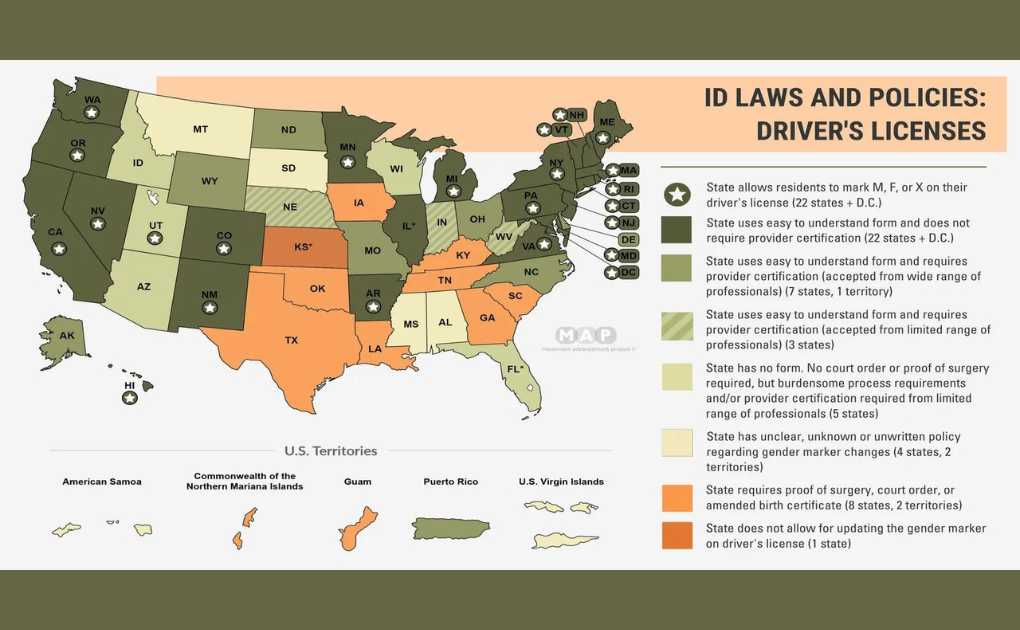
Transgender Floridians can no longer change the listed gender on their driver licenses.
The Florida Department of Highway Safety and Motor Vehicles quietly announced the change in a memo late last week sent to county tax collectors, where state residents can get licenses.
Previously, Florida residents could change their gender marker by submitting either a court order for a name change or an official physicians letter for proof of gender transition treatment, according to the National Center for Transgender Equality.
NCTE spokesperson Ash Orr, who uses he or they pronouns, said the new ban adds to Florida’s long list of harmful policies that target the transgender people.
“Access to identity documents is crucial in daily life, impacting activities like work, voting, travel, and engagement with government institutions,” Orr said in a Tuesday statement. “Ensuring everyone, including transgender people, have accurate official documents, such as driver’s licenses, is vital for upholding our institutional rights.”
Prep for the polls: See who is running for president and compare where they stand on key issues in our Voter Guide
Florida issues driver’s license memo as similar bill moves in state legislature
Florida DHSMV’s deputy executive director Robert Kynoch said in the memo that someone “misrepresenting” their gender, meaning not using their sex assigned at birth, constitutes “criminal and civil” fraud.
“Permitting an individual to alter his or her license to reflect an internal sense of gender role or identity, which is neither immutable nor objectively verifiable, undermines the purpose of an identification record and can frustrate the state’s ability to enforce its laws,” the memo states.
The department separately issued a statement saying, in part, that the move was begun by executive director Dave Kerner, who “tasked senior Department leadership with ensuring our policies, procedures, and technical guidance/advisories were consistent with both statutory law and the Department’s inherent authority.
“… Expanding the Department’s authority to issue replacement licenses dependent on one’s internal sense of gender or sex identification is violative of the law and does not serve to enhance the security and reliability of Florida issued licenses and identification cards. The security, reliability, and accuracy of government issued credentials is paramount,” it adds.
The memo comes as state Republican lawmakers are pushing a bill requiring driver’s licenses to display the carrier’s sex at birth rather than their gender identity.
The Florida DHSMV’s policy change drew criticism from state Democrats. “Florida Republicans’ obsession with trans people has to stop,” said Florida Democratic Party Chair Nikki Fried. “We’ve seen state agencies continually weaponized under Ron DeSantis, and this rule change at DHSMV serves the same purpose as the rest — allowing right-wing extremists to get the wildly unpopular policies they want without having to go on the record as voting for them.”
Florida joins states with barriers to gender marker changes on driver’s licenses
Florida joins Kansas in fully banning transgender residents from updating their gender markers on their driver’s licenses. In Kansas, a temporary order is in place banning changes while an ongoing legal battle between the Kansas Department of Revenue and the Republican attorney general plays out to determine whether that policy will stick, the Associated Press reported.
Data compiled by the Movement Advancement Project (MAP), a non-profit think tank researching LGBTQ-related policies, shows that the following states require proof of surgery, a court order, or an amended birth certificate to permit changes to their gender on a driver’s license. These are considered to have “negative laws”, which are burdensome requirements that may prevent people from being able to make the change at all, according to MAP and NCTE.
- Georgia
- Iowa
- Kentucky
- Louisiana
- Oklahoma
- South Carolina
- Tennessee
- Texas
MAP spokesperson Rebecca Farmer said that Montana has passed new legislation defining sex that is narrow and prevents people from changing their driver’s license’s gender markers, even though there is no specific law is on the books for it.
Research shows positive laws for driver’s license gender marker changes in these states
MAP considers the following states to have laws that are conducive for transgender and nonbinary people to change their driver’s licenses, listed as having “positive laws.” These states all use an easily understood form and either require no certification from a provider or allow certification to come from a range of providers.
- Alaska
- Delaware
- Illinois
- Missouri
- North Carolina
- North Dakota
- Ohio
- Wyoming
Laws governing transgender and nonbinary people changing gender markers on their driver’s license. The data is compiled by the Movement Advancement Project, a non-profit think tank researching LGBTQ-related policies.
In addition to having low barriers to changing gender markers, these states also allow for gender neutral “X” markers:
- Arkansas
- California
- Colorado
- Connecticut
- Hawaii
- Maine
- Maryland
- Massachusetts
- Michigan
- Minnesota
- Nevada
- New Hampshire
- New Jersey
- New Mexico
- New York
- Oregon
- Pennsylvania
- Rhode Island
- Vermont
- Virginia
- Washington
Utah also allows for gender neutral markers on a driver’s license, but does not have positive laws, according to MAP. Other states not listed either do not have formal laws or have somewhat burdensome policies that MAP does not list either positive nor negative.
Orr said consequences of having inaccurate identification extend beyond the administrative issues.
“When a government agency refuses to provide identification that aligns with a person’s identity, it implies that the identity and, consequently, the individuals themselves are not valid or worthy of respect,” Orr said. ” All people, including transgender Floridians have the right to live in a safe and thriving environment, free from discrimination and harassment.”



